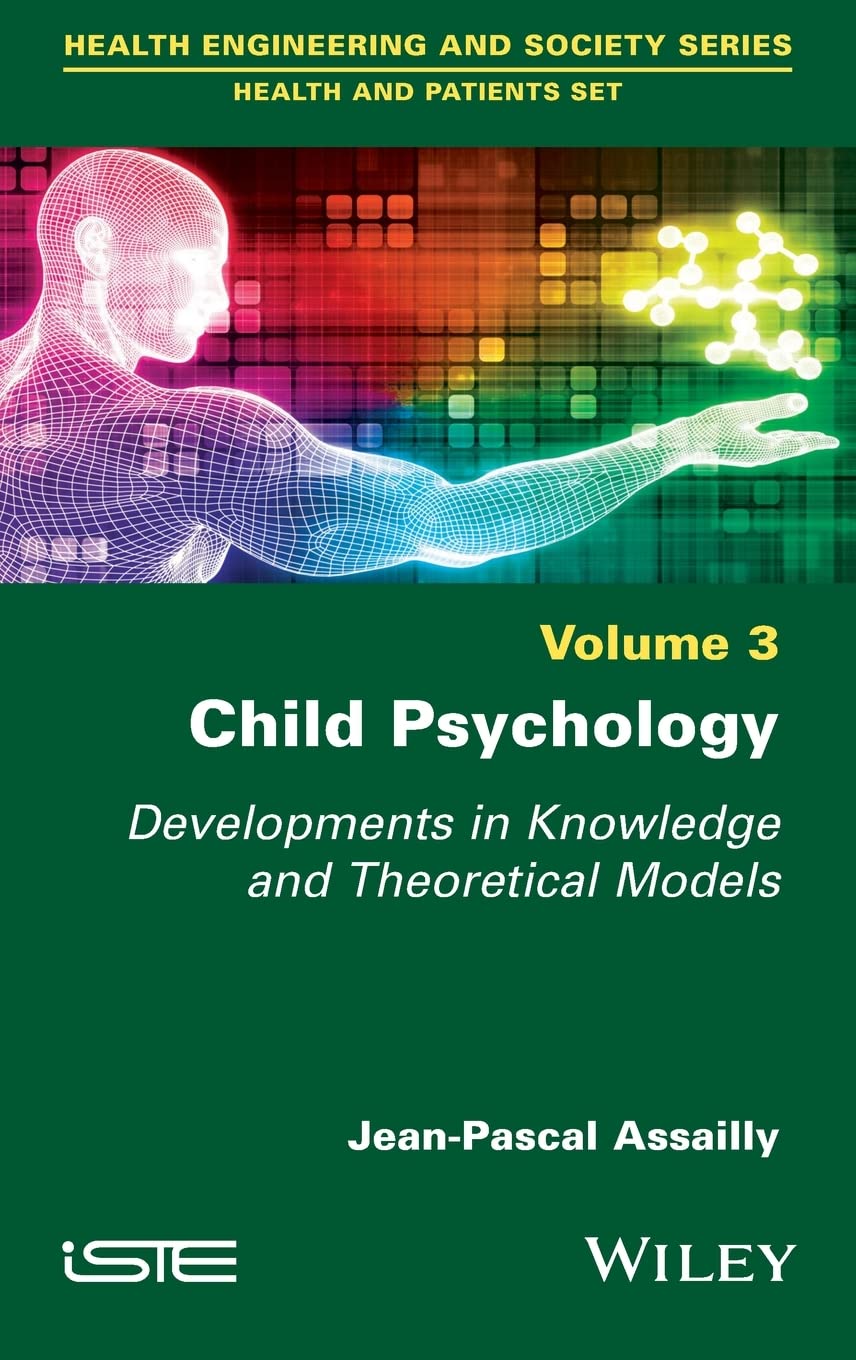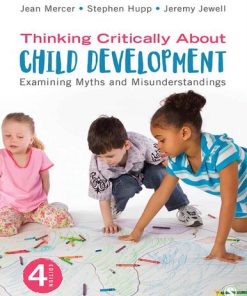Child Psychology Developments in Knowledge and Theoretical Models 1st Edition by Jean Pascal Assailly 1119902134 9781119902133
$50.00 Original price was: $50.00.$25.00Current price is: $25.00.
Child Psychology Developments in Knowledge and Theoretical Models 1st Edition by Jean Pascal Assailly- Ebook PDF Instant Download/Delivery: 1119902134, 9781119902133
Full download Child Psychology Developments in Knowledge and Theoretical Models 1st Edition after payment

Product details:
ISBN 10: 1119902134
ISBN 13: 9781119902133
Author: Jean-Pascal Assailly
This book reviews the current state of knowledge in the field of child and adolescent psychology. It distinguishes between what is new in child psychology, given that certain phenomena did not previously exist in a significant way in the lives of young people (such as homoparentality, attacks, cyber-bullying or Covid-19). It also examines new studies of subjects that already exist and have done so for a long time (intelligence, the mother-child relationship, etc.), but where significant theoretical developments have taken place in the contemporary period.
Child Psychology explores the influences of culture and parenthood, parent-child attachment, cognitive development, the differences between boys and girls, gender and its stereotypes, health, illness and mortality, antisociality, activities and leisure
Child Psychology Developments in Knowledge and Theoretical Models 1st Table of contents:
1 Interdisciplinary Themes
1.1. The question of prediction
1.2. Development concepts
1.3. To what extent is a dialog or coming together possible between developmental psychology and psychoanalysis? Between the observable and the repressed
1.4. Between psychology and epidemiology, developmental psychopathology
1.5. Childhood and culture, anthropological approaches
1.6. Childhood and family in history
1.7. Adolescent development and its contemporary evolution
1.8. The family and its contemporary evolution
1.9. Social class, family income and poverty
1.10. Parenting and parenting styles: how do we find the “right balance”?
1.11. Maternal employment in early childhood
1.12. Child care
1.13. Ranking among siblings
1.14. Sibling size
1.15. Twins
2 The Fetus and Fetal Life
2.1. Conception and medically assisted procreation: children born through medically assisted procreation
2.2. The issue of genetic screening
2.3. Knowledge of the child’s sex
2.4. The sensory and psychological functioning of the fetus
2.5. Stress and maternal psychopathology
2.6. Prenatal exposures
2.7. Microbiota
3 Perinatal Care and the Infant
3.1. Perinatal care
3.2. The infant stage (0–2 years)
4 What’s New in Cognition?
4.1. The child’s brain
4.2. The question of universality
4.3. The theory of mind
4.4. Metacognition
4.5. Mirror neurons
4.6. Embodied cognition
4.7. The issue of programming, “starter kits”, neuroplasticity and the need for an integrative approach
4.8. Vygotsky and the zone of proximal development model
4.9. Contributions from the mother and father
4.10. Intelligence, its definition and measurements
4.11. The question of the “drop in level” of French children
4.12. Children with high potential (“giftedness”)
4.13. Learning disabilities, the “dys” disorders
4.14. Creativity
4.15. Moral development
4.16. Language
5 Attachment
5.1. The concept of attachment
5.2. The biological bases and correlates of attachment
5.3. The mother’s response to the need for attachment
5.4. The father and attachment
5.5. The concordance between attachment types
5.6. Paternal behavior
5.7. Sibling attachment
5.8. Attachment to objects
5.9. Attachment and child care
5.10. Attachment disorders
5.11. Attachment, the individual and the family
5.12. The character (or temperament) of the individual
5.13. Attachment and the child’s gender
5.14. Attachment in adolescence
5.15. Attachment and the Internet
5.16. Attachment and risk taking
5.17. Attachment and addictions
5.18. Attachment and transgression
5.19. Attachment, antisocial behavior and hyperactivity
6 The Differences between Boys and Girls, Gender and Stereotypes
6.1. Developmental data
6.2. Mathematics, spatial skills and stereotypes
6.3. Risk taking, risk perception and stereotypes
7 Health, Disease and Mortality
7.1. Health behaviors
7.2. The issue of vaccination
7.3. The age 4 health check
7.4. Laterality
7.5. Child size
7.6. Vision and myopia
7.7. Physical activity
7.8. Eating behavior
7.9. Anorexia
7.10. Obesity
7.11. Sleep
7.12. Dreaming
7.13. Consumption of psychoactive products
7.14. Children’s road safety
7.15. Emotions, emotional development and emotional intelligence
7.16. Hyperactivity
7.17. Suicide
7.18. Autism
7.19. Mortality
8 Socialization and Antisociality
8.1. Lying
8.2. Lying in parents
8.3. Antisociality
8.4. Abuse
8.5. Sexual abuse
8.6. Exposure to domestic violence
8.7. Foster care
8.8. Parental usage of psychoactive substances
8.9. Discord and separation of parents
8.10. Peer influence
9 Activities and Leisure
9.1. Play: from act to thought
9.2. Sports activities: Homo Ludens… Citius, Altius, Fortius… Bread and games…
9.3. The digital child and the issue of screens
9.4. Video games
9.5. The use of telephones
9.6. Social networks (TikTok, Snapchat, Facebook, Instagram, etc.)
9.7. Music
10 Emerging Issues
10.1. Children living in same-sex parent families
10.2. Homeless children
10.3. Migrants
10.4. Children of military personnel
10.5. Disaster psychology (wars, bombings, tsunamis, earthquakes)
10.6. Political influences
10.7. The environment (neighborhood, nature, city)
10.8. Cyberbullying
10.9. Covid-19
Conclusion
C.1. Awareness of the early influences (positive and negative) of the prenatal and postnatal (fetal, microbiota) environments
C.2. Early development of certain perceptual and cognitive skills
C.3. New concepts in the field of cognition
C.4. The need to develop an integrative approach
C.5. A spiral causality produced by interactions
C.6. At the heart of self-endangerment: the lack of sensitivity to loss
C.7. Gender differences, gender and stereotypes
C.8. The family environment, again and always
C.9. Historical developments
C.10. New research themes generated by societal developments
Appendix: Definitions of Some Concepts Used in this Book
A.1. Phylogenesis/ontogenesis
A.2. Factor/marker
A.3. Epigenetic factors
A.4. Externalized and internalized behavioral disorders
References
Index
End User License Agreement
People also search for Child Psychology Developments in Knowledge and Theoretical Models 1st :
child psychology development in a changing society
child psychology development
child psychology developmental stages
a child development researcher established a password
You may also like…
Uncategorized
Education Studies & Teaching - Studying & Test Preparation
Education Studies & Teaching - Studying & Test Preparation
Psychology 2nd Edition by Jean-Marc Lawton 9781510425774 1510425772
Biology and other natural sciences - Biology
History - World History
Psychology - Developmental Psychology
Thinking Critically About Child Development 4th Edition Jean Mercer










